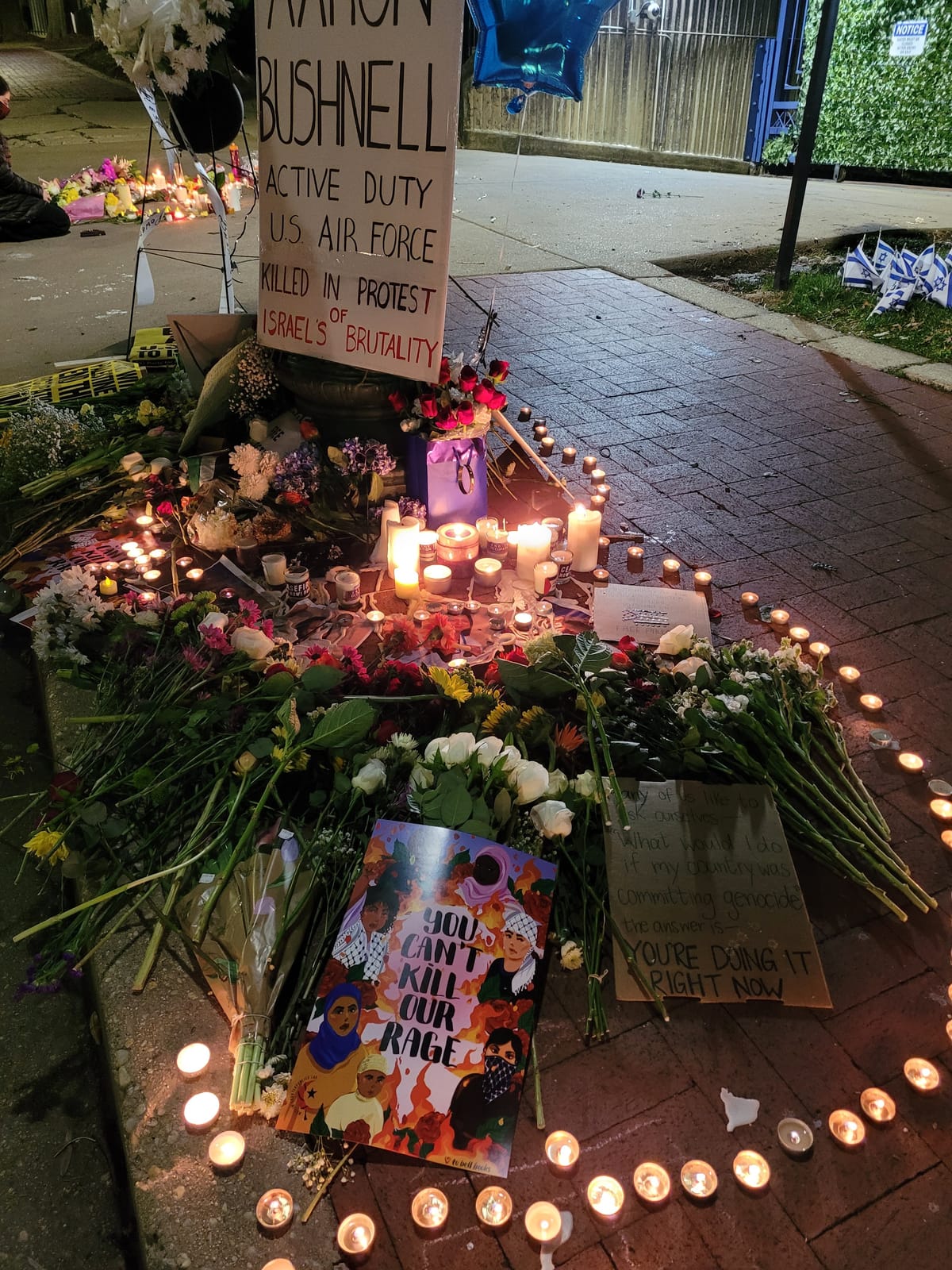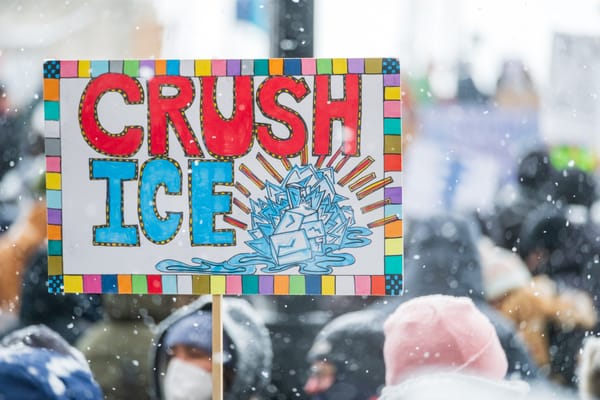Aaron Bushnell Died for Palestine
"This is what our ruling class has decided will be normal," Aaron Bushnell said.


Aaron Bushnell died for Palestine. Bushnell, a 25-year-old active-duty member of the U.S. Air Force, set himself on fire in front of the Israeli Embassy in Washington D.C. Sunday afternoon after declaring that he would “no longer be complicit in genocide." As the flames consumed him, a police officer pointed a gun at Bushnell, who yelled out the words “Free Palestine” in pained screams until his voice fell silent.
Despite the fact that Bushnell died while engaging in what he called “an extreme act of protest,” multiple major news outlets ran headlines that depoliticized his tragic death. A New York Times headline read, “Man Dies After Setting Himself on Fire Outside Israeli Embassy in Washington, Air Force Says.” CNN and Reuters both ran the headline, “US airman sets himself on fire outside Israeli Embassy in Washington.” The Washington Post took a similar approach, opting for the language, “Active-duty airman sets himself on fire outside Israeli Embassy in Washington.” An article about Bushnell published by NPR stated, “As of Monday morning, NPR was not able to independently verify the man’s motives.”
Aaron Bushnell, however, had already verified his motives. Bushnell streamed his self-immolation on the platform Twitch using an account that was apparently created in order to broadcast his death. The original video was swiftly removed from the streaming platform. I watched a censored version, which was posted by journalist Talia Jane. Jane said they had received permission from Bushnell’s loved ones to post a version of the video that was edited to obscure the sight of Bushnell’s burning body. At the beginning of the video, Bushnell introduced himself, saying, “My name is Aaron Bushnell. I am an active-duty member of the United States Air Force, and I will no longer be complicit in genocide.” As he approached the Israeli Embassy, Bushnell stated, “I’m about to engage in an extreme act of protest. But compared to what people have been experiencing in Palestine at the hands of their colonizers, it’s not extreme at all. This is what our ruling class has decided will be normal.”
Upon reaching the embassy, Bushnell backed away from the camera. In his hand, he held a thermos that was adorned with stickers. He opened the thermos and poured a flammable substance over his head and body before lighting himself on fire. As the flames engulfed him, he repeatedly yelled, “Free Palestine!”
With his dying breaths, Aaron Bushnell cried out for a free Palestine, and yet the U.S. media has set out to suppress the meaning and purpose of his sacrifice. This erasure is not shocking in light of the anti-Palestinian bias that publications like The New York Times have previously demonstrated.
Over the weekend, the Times reportedly “cut ties” with freelancer Anat Schwartz, who co-authored an influential and inflammatory piece for the publication, which claimed that Hamas systematically used sexual violence as a weapon of war on October 7. Schwartz faced fierce criticism on social media after another Twitter user discovered that Schwartz clicked “like” on a post that called for Gaza to be turned into a “slaughterhouse.” The piece Schwartz co-authored has been widely criticized for its alleged inconsistencies, misrepresentations, and inadequate fact-checking. Critics of the piece include an Israeli family whose story was central to the article and staff members of the Times.
I will not rehash the allegations of that infamous piece or outline the many concerns that have been raised about it. The pro-Israel bias of the piece is not abnormal for the Times or for the U.S. media in general, and this certainly isn’t the first crisis of legitimacy the Times has faced for biased reporting. Anyone who remembers the run-up to the 2003 invasion of Iraq knows the Times has a rich history of publishing lies that facilitate mass violence – and that they have not been alone in that work. The vague headlines and feigned uncertainty found in coverage of Bushnell's death are also familiar. Israel's atrocities, much like police violence in the United States, are usually framed as unsubstantiated allegations by major publications. If the truth incriminates the U.S. or Israel, it is rarely expressed with clarity.
Bushnell's suicide is the story of a member of the U.S. armed forces who chose death over an affiliation with genocide. That is a narrative that a lot of people would like to bury. By livestreaming his death, Bushnell dared us to witness the kind of horror that the U.S. has facilitated in Gaza, where more than 29,000 Palestinians have been slaughtered by the Israeli military. Bushnell died to divorce himself from that violence and to force us to reckon with it. "This is what our ruling class has decided will be normal," he said.
The efforts we have seen to erase Bushnell’s motives are unconscionable, which is why I began this piece by stating a truth so undeniable, so heartbreaking, and so unpredictable in its impact that the stenographers of genocidaires and their apologists felt compelled to suppress it: Aaron Bushnell died for Palestine.
Following his death, the mutual aid organization Serve The People Akron released a statement on social media that praised Bushnell’s work supporting unhoused community members, calling him a “valued member of our organization.” Serve The People wrote that Bushnell was dependable and persistent “with the mutual aid work he did in a city that was still new to him.” The group expressed gratitude for Bushnell’s organizing work, stating, “We will be forever grateful for the effort he put in to make Akron a better place.” Serve The People also urged the public to honor Bushnell’s sacrifice. “We are all still devastated to learn of his passing but we do not want his actions to go in vain. Please continue your education, advocacy, and support for the Palestinian people,” they wrote.
Talia Jane posted comments from some of Bushnell’s friends and co-strugglers, including Xylem, who worked with Bushnell to support San Antonio’s unhoused residents. Xylem told Jane, “He is one of the most principled comrades I’ve ever known.”
Another friend of Bushnell’s, whom Jane identified as Errico, said of Bushnell, “He’s always trying to think about how we can actually achieve liberation for all with a smile on his face.”
More than 100 people gathered outside the Israeli Embassy in Washington D.C. Monday night to pay tribute to Bushnell. Mourners also gathered in Los Angeles and Long Beach, California. Vigils will be held in Chicago, Portland, and New York City on Tuesday and Wednesday.
Some people have raised concerns that honoring Bushnell amounts to a glorification of suicide. I do not believe Bushnell was seeking glory any more than I believe that the compassion, grief, and empathy that many people have expressed amount to glorification. However, there is no way to neatly reconcile the horrors of this genocidal moment with our fears or feelings about suicide or death. As I recently told a dear friend, "We weren't meant to live this way, and they weren't meant to die this way." More than 12,300 Palestinian children should not be dead. 7,000 people should not be buried under the rubble. 1.9 million Palestinians should not be displaced. Israeli civilians should not be organizing celebratory blockades to prevent humanitarian aid from reaching Gaza. Images of murdered and dismembered children should not fill our social media feeds. More than 29,000 murdered Palestinians should still be alive, and Aaron Bushnell should be working on mutual aid projects with his friends. There is no “right way” to process the unthinkable; we can only hold people in their humanity, honor the dead, and defend the living.
Self-immolation is a tragedy that, in many cases, signals a collective failure so egregious that everything, including our well-reasoned sensibilities, should be upended by it. To withhold our compassion, our understanding, our solidarity, or any other human response to such sacrifices does nothing to sanctify or protect life. We should be consumed by the horror of such acts, just as Bushnell was consumed by the flames he ignited. We should be jarred into action and determined to build a front so powerful that no person of conscience feels desperate enough to view a fiery death as their only recourse.
Bushnell was not the first person in the U.S. to self-immolate in order to protest the genocide Israel is waging in Gaza. In December, an unidentified person set themselves on fire near the Israeli consulate in Atlanta in what police characterized as “likely an extreme act of protest.” The fate of the individual in that case is not publicly known.
Bushnell’s final act of protest was part of a tragic lineage that has unfolded across the course of human history. People have set themselves ablaze to protest religious persecution, warfare, structural oppression, the destruction of the natural world, and many other injustices. A refusal to acknowledge and understand such desperate deaths devalues the humanity of those we have lost and denies their dying plea: that we see, that we feel, that we understand and that we act accordingly. We must hold the truth of Bushnell’s final act in our hearts, and we must resist any erasure of why his young life came to an end. We must remember, and we must tell the truth that enablers of genocide would erase: Aaron Bushnell died for Palestine.
Author's Note: If you are struggling with depression or despair, please take care of yourself. You are loved and needed. If you need support, these resources from Dandelion Hill might be helpful:




